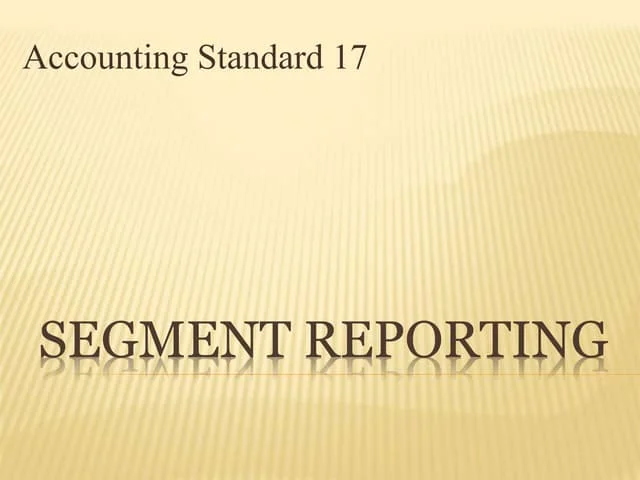AS 17, or Accounting Standard 17, mandates how enterprises should disclose financial information about their operating segments and geographical segments in their financial statements. The standard aims to provide transparency and clarity regarding an enterprise’s business activities and economic environment.

DEFINITION
A BUSINESS SEGMENT, is defined as a distinguishable component of an enterprise that is engaged in providing products or services (or a group of related products or services) and that is subject to risks and returns that are different from those of other business segments. In simpler terms, it’s a part of an enterprise that operates in a distinct business environment and is separately identifiable in terms of its activities and profitability.
This standard establishes requirements for the disclosure of:
a) Related party relationships
b) Transactions between a reporting enterprise and its related parties.
The requirements of this Standard apply to the financial statements of each reporting enterprise as also to consolidated financial statements presented by a holding company.
What is the meaning of Related party
As per AS 18, Related party means “at any time during the year, one party has an ability to:
- Control* the other party
- Exercise significant influence over the other party in making financial and/or operating decisions
Who is covered under Related party relationships
- Holding companies, subsidiaries and fellow subsidiaries;
- Associates and joint ventures of the reporting enterprise;
- Investors in respect of which reporting enterprise is an associate or a joint venture;
- Individuals owing direct or indirect interest in the voting power of the reporting enterprise that gives them control or significant influence over the enterprise, and relatives of any such individual;
- Key management personnel and his relatives; and
- Enterprises over which any person, who is a key management personnel or has direct and indirect interest in voting power, can exercise significant influence
Why do we need Related party disclosures
- Requirement of statutes: The statutes governing an enterprise often require disclosure of related party transactions in the financial statements.
- To reflect that transaction may not be at arm’s length price: Without related party disclosures, there is a general presumption that transactions reflected in the financial statements are on an arm’s length basis i.e. the transaction occurs between two unrelated parties and is not affected by any relationship.
- Effect on Financial position and operating results: The operating results and financial position of an enterprise may be affected by a related party relationship even if related party transactions do not occur. The mere existence of the relationship may be sufficient to affect the transactions of the reporting enterprise with other parties
- Recording of all possible transactions: Related party transactions needs to be disclosed as sometimes, transactions would not have taken place if the related party relationship had not existed.
What needs to be disclosed under AS 18
- The name of the transacting related party;
- A description of the relationship between the parties;
- A description of the nature of transactions;
- Volume of the transactions either as an amount or a part thereof;
- Any elements of the related party transactions which is necessary for an understanding of the financial statements;
- Outstanding amount from related parties at the balance sheet date;
- Provisions for doubtful debts due from related parties at the balance sheet date; and
- Amounts written off or written back of debts due from or to related parties.
Cases when disclosure is not required
- Intra-group transactions
- Enterprises who have statutory requirement of confidentiality
- Related party relationships of State-controlled enterprises with other state-controlled enterprises
FAQs
What is AS 17?
AS 17, or Accounting Standard 17, pertains to segment reporting in financial statements. It provides guidelines on how entities should report financial information for different segments of their business, allowing users of financial statements to better understand the financial performance and position of various segments.
Why is segment reporting important?
egment reporting is important because it provides insights into the different areas of a business, helping stakeholders assess its performance and risks. It enhances transparency, enabling investors, analysts, and management to make informed decisions based on the performance of various segments.